|
|
The Hieromartyr Januarius, and those with him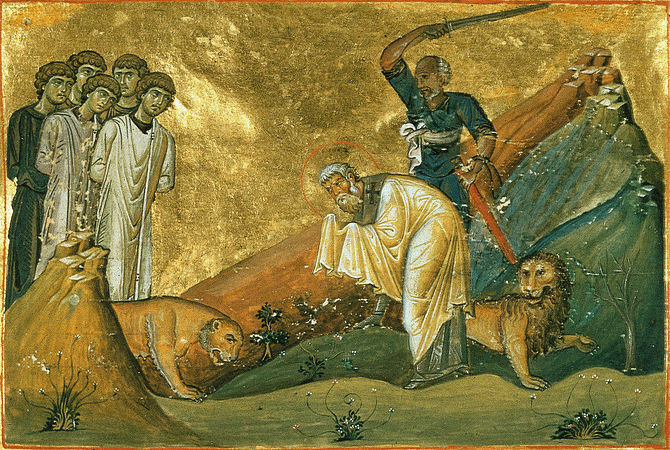 This saint was Bishop of Benevento in Italy. In the time of a persecution under Maximian, he was brought before the judge and tormented with various tortures, which he endured patiently. When they threw him into the flames, they were cooled by an invisible dew and the martyr stood uninjured in it and sang the praises of God. Then they flayed his body with iron flails until the bones showed white, but the martyr patiently endured all. His deacon, Faustus, and his reader, Desiderius, were watching the torture and wept for their spiritual father. Then they too were bound and taken with their bishop to the town of Pozzuoli, and cast into prison. There were in the same prison for the sake of Christ the Puetolian deacons Proclus and Sossus and two simple, Christian men, Eutychius and Acutius. All seven were thrown next day to the wild beasts, but the beasts would not touch them. They were all then beheaded, and the Christians of the city of Naples secretly took the body of St Januarius to their city and buried it in the church. To this present day innumerable wonders are worked at this saint's grave. One among many remembered is this: a poor widow, whose only son had died, took the icon of St Januarius out of the church and laid it on her dead son, weeping and imploring the saint's aid, and her son was restored to life. St Januarius suffered with honour in 305. This saint was Bishop of Benevento in Italy. In the time of a persecution under Maximian, he was brought before the judge and tormented with various tortures, which he endured patiently. When they threw him into the flames, they were cooled by an invisible dew and the martyr stood uninjured in it and sang the praises of God. Then they flayed his body with iron flails until the bones showed white, but the martyr patiently endured all. His deacon, Faustus, and his reader, Desiderius, were watching the torture and wept for their spiritual father. Then they too were bound and taken with their bishop to the town of Pozzuoli, and cast into prison. There were in the same prison for the sake of Christ the Puetolian deacons Proclus and Sossus and two simple, Christian men, Eutychius and Acutius. All seven were thrown next day to the wild beasts, but the beasts would not touch them. They were all then beheaded, and the Christians of the city of Naples secretly took the body of St Januarius to their city and buried it in the church. To this present day innumerable wonders are worked at this saint's grave. One among many remembered is this: a poor widow, whose only son had died, took the icon of St Januarius out of the church and laid it on her dead son, weeping and imploring the saint's aid, and her son was restored to life. St Januarius suffered with honour in 305. The Holy Martyr Theodore, and others with him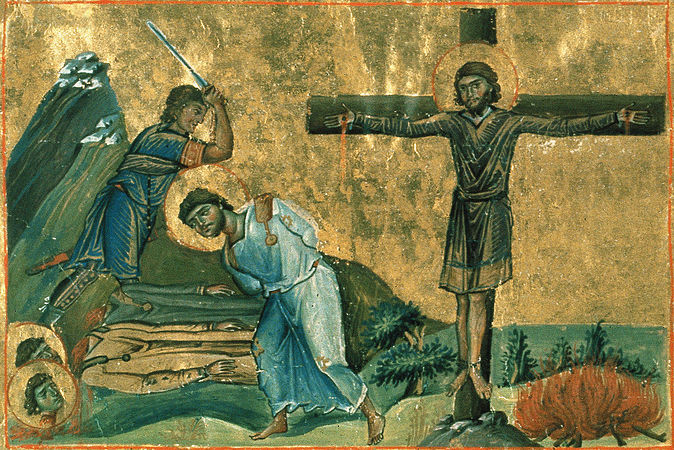 He suffered for the Christian faith in Perga of Pamphylia in the time of the Emperor Antoninus. Theodore was young and fair of face. When the governor of that district chose him, along with several other young men, for service at the imperial court, Theodore refused and declared himself to be a Christian. Because of this, he was tortured in various ways and then thrown into the flames, but water gushed from the earth and put out the fire. The governor ascribed this to some magic of Theodore's, but the martyr said to him: 'This is not the work of any power of mine, but of Christ my God; and if you want to test the power of your gods, light another fire and throw in one of your soldiers - then I hope you will understand the strength and almighty power of my God.' The governor really wanted to throw in one of the soldiers, but they, in terror, begged him to throw in the pagan priest, Dioscorus, in their place. The priest begged him to throw in only the idol of Zeus and the other idols, for, he said, if they were gods they would easily save themselves. Dioscorus spoke thus because he had already in his heart turned to Christ, having seen the marvel wrought concerning Theodore. Discovering this, the governor condemned Dioscorus to death by burning. He also delivered Theodore and two soldiers, Socrates and Dionysius, and Theodores's mother Philippa, to death. Theodore was crucified, and breathed his last on the cross only on the third day. Socrates and Dionysius were run through with spears and Philippa was beheaded. They were all crowned with wreaths of glory in the Kingdom of Christ. He suffered for the Christian faith in Perga of Pamphylia in the time of the Emperor Antoninus. Theodore was young and fair of face. When the governor of that district chose him, along with several other young men, for service at the imperial court, Theodore refused and declared himself to be a Christian. Because of this, he was tortured in various ways and then thrown into the flames, but water gushed from the earth and put out the fire. The governor ascribed this to some magic of Theodore's, but the martyr said to him: 'This is not the work of any power of mine, but of Christ my God; and if you want to test the power of your gods, light another fire and throw in one of your soldiers - then I hope you will understand the strength and almighty power of my God.' The governor really wanted to throw in one of the soldiers, but they, in terror, begged him to throw in the pagan priest, Dioscorus, in their place. The priest begged him to throw in only the idol of Zeus and the other idols, for, he said, if they were gods they would easily save themselves. Dioscorus spoke thus because he had already in his heart turned to Christ, having seen the marvel wrought concerning Theodore. Discovering this, the governor condemned Dioscorus to death by burning. He also delivered Theodore and two soldiers, Socrates and Dionysius, and Theodores's mother Philippa, to death. Theodore was crucified, and breathed his last on the cross only on the third day. Socrates and Dionysius were run through with spears and Philippa was beheaded. They were all crowned with wreaths of glory in the Kingdom of Christ. Martyr Alexandra the Empress (303)Saint Festus, Proclus, and Sosius, deacons; Desiderius, reader; and Eutychius and Acutius, laymen, at Pozzuoli (305)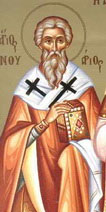 Companions of saint Januarius who suffered about the year 305 during the persecution ordered by the emperor Diocletian (284-305). Companions of saint Januarius who suffered about the year 305 during the persecution ordered by the emperor Diocletian (284-305).Saint martyr Philippa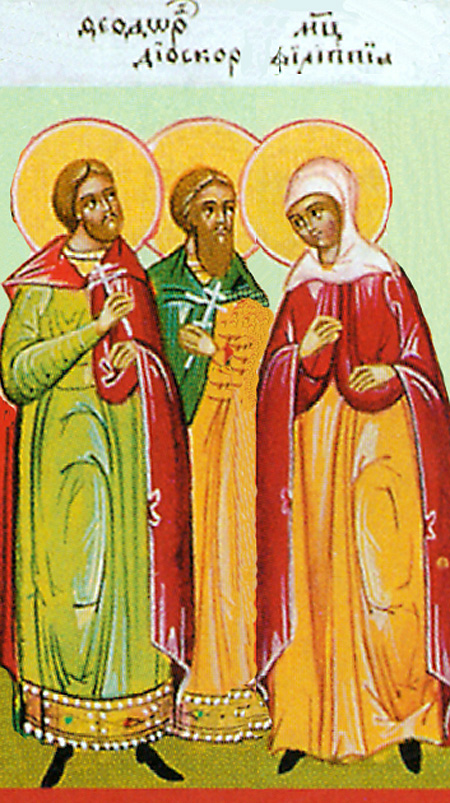 The Holy Martyrs Theodore, his mother Philippa, Dioscorus, Socrates and Dionysius suffered during the reign of the emperor Antoninus Pius (138-161) in Perge, Pamphylia. When they were conscripting robust and healthy young men for military service, then they led the youth Theodore and the others to the military commander Theodotus.... The Holy Martyrs Theodore, his mother Philippa, Dioscorus, Socrates and Dionysius suffered during the reign of the emperor Antoninus Pius (138-161) in Perge, Pamphylia. When they were conscripting robust and healthy young men for military service, then they led the youth Theodore and the others to the military commander Theodotus....Martyrs Dioscorus, Socrates, and Dionysius (2nd c.)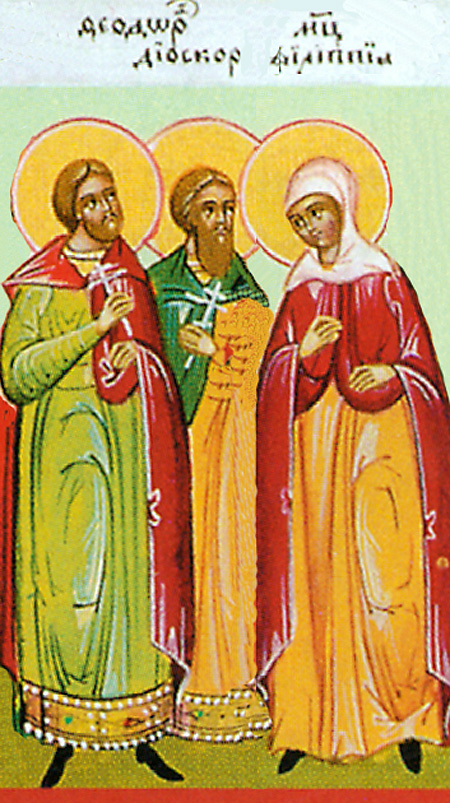 The Holy Martyrs Theodore, his mother Philippa, Dioscorus, Socrates and Dionysius suffered during the reign of the emperor Antoninus Pius (138-161) in Perge, Pamphylia. When they were conscripting robust and healthy young men for military service, then they led the youth Theodore and the others to the military commander Theodotus.... The Holy Martyrs Theodore, his mother Philippa, Dioscorus, Socrates and Dionysius suffered during the reign of the emperor Antoninus Pius (138-161) in Perge, Pamphylia. When they were conscripting robust and healthy young men for military service, then they led the youth Theodore and the others to the military commander Theodotus....St. Maximus (Maximian), patriarch of Constantinople (434) Saint Maximian, Patriarch of Constantinople, was born in Rome from wealthy and pious parents. Upon coming into the means he arranged for tombs for burial of the dead, glorified by sanctity of life.
Saint Maximian was a plain man and he loved to live removed from worldly vanity. For his pure and virtuous life, at Constantinople Patriarch Sisinios (426-427) ordained him presbyter. Upon the deposing from the Constantinople throne of the heretic Nestorius (428-431), the monk-presbyter was elevated onto the patriarchal throne on 25 October 431, during the rule of the holy emperor Theodosius the Younger (408-450).
The holy Patriarch Maximian died peacefully on 12 April 434, on Great Thursday. Saint Maximian, Patriarch of Constantinople, was born in Rome from wealthy and pious parents. Upon coming into the means he arranged for tombs for burial of the dead, glorified by sanctity of life.
Saint Maximian was a plain man and he loved to live removed from worldly vanity. For his pure and virtuous life, at Constantinople Patriarch Sisinios (426-427) ordained him presbyter. Upon the deposing from the Constantinople throne of the heretic Nestorius (428-431), the monk-presbyter was elevated onto the patriarchal throne on 25 October 431, during the rule of the holy emperor Theodosius the Younger (408-450).
The holy Patriarch Maximian died peacefully on 12 April 434, on Great Thursday. |